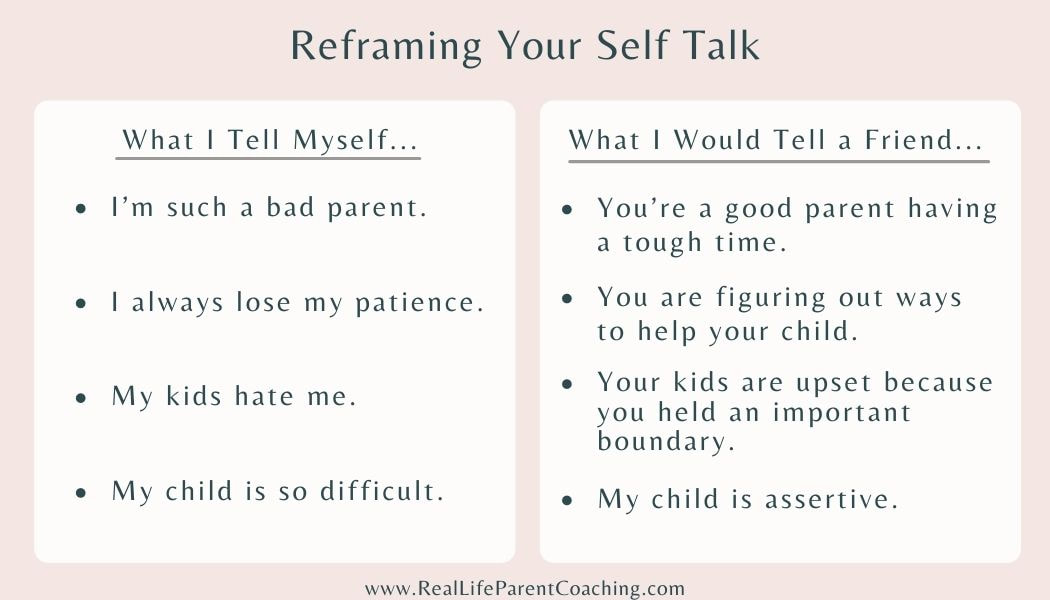5 Tips for Reframing Your Self-Talk! Are you looking for one small change to help you live a more positive lifestyle? A change that would not only help you, but a change that could benefit your whole family? If your answer is ‘Yes, please!!,’ let’s talk about reframing negative self-talk. Many of us are familiar with an inner voice that likes to judge and hold us back. This judge feeds us negative thoughts and tries to keep us from reaching our potential. Do you know the judge I’m speaking of? Do you hear that voice right now? Here’s the big problem with negative self-talk. Aside from it holding you from your potential, negative self-talk models an inner voice for your children. It projects a negative vibe in your home and models what self-talk ‘should’ sound like to your children. If you want your children to be kinder to themselves, a great place to start is to be kinder to yourself. Let’s debunk what you may already think about reframing! Reframing is NOT sugar coating. It is not falsely telling yourself everything is fine. Reframing IS about finding the good in your situation to help you see a more positive mindset moving forward. To me, the best part of reframing is knowing it is something I have control over. I can acknowledge the ‘fake news’ my inner judge is feeding me and choose to find a better perspective. I have full control over how I want to perceive any situation and how I want to present myself to my children and others. Are you ready to start reframing your self-talk to reflect more positive and energizing thoughts? Five Tips to get you started - 1. Acknowledge your thoughts When you notice yourself going down a negative path, press pause and take a breath. Realize that your inner judge is trying to sabotage your thoughts — remind yourself you have a choice here! With this awareness, what will you choose to do with your thoughts? 2. Switch “I have to...” to “I get to…” This simple swap out changes an obligation into an opportunity. When you think to yourself “I have to,” your mind automatically thinks, ‘chores!’ and the adrenaline rush begins. By simply stating, “I get to,” you can shift your mindset to see the opportunities within your task. 3. Watch your language! Avoid words like ‘always’, ‘never’ and ‘should.’ Using absolute terms like these make phrases seem hopeless. They’re also inaccurate - there is almost ‘always’ an exception. 4. Be more open-minded. Before you decide how the outcome will turn out, why not smell the roses along the way. Try not to jump to conclusions. When we catastrophize our situations, we are fixed on only one outcome, when in reality, there are several ways a situation can go. A fixed mindset limits your possibilities. A growth mindset is open to an array of choices. What we focus on grows! Try to focus on the good and see the possibilities that may come! 5. Show some Compassion. Are you even aware of the words you use to speak to yourself? I‘m guessing you’d see things in a more forgiving light if you were speaking about a friend's situation. What words would you use to speak to your friend? Consider speaking to yourself in the same manner. The goal is healthy self-talk. Healthy self-talk will inspire your child’s healthy self-talk. Let’s try it! Get a piece of paper, make two columns (or download my journal entry sheet here), and let’s start reframing! What are some negative thoughts you might tell yourself? Now, how would you reframe those thoughts for a friend? Love yourself & treat yo’self right with positive self-talk! Reframing isn’t always easy, but it’s surely worth it! As it is with many things in life, reframing your self-talk takes practice. With repetition, your brain will begin to generate new neural pathways allowing positive self-talk and thought processes to feel more automatic.
Where will you choose to focus your attention? Will you choose to dwell on the negatives, or reframe and look towards the positives?
0 Comments
Leave a Reply. |
AuthorRebecca Murphy, Certified PCI® Parent Coach. CategoriesCategoriesArchives
October 2023
|
'Creating solutions for your Real Life family situations.'
©2019, Real Life Parent Coaching, LLC
Proudly powered by Weebly


 RSS Feed
RSS Feed


